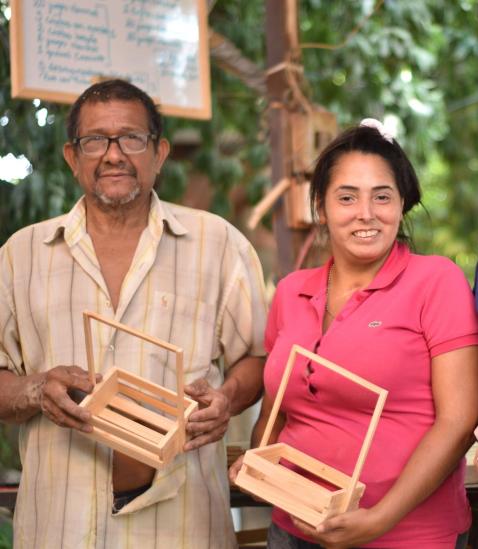Thank you for reading our 2021 Impact Report: Step by Step Toward Peace. As promised in that report, here are some additional feel-good stories we could not fit into the pages of the report. Enjoy, and thanks again for your continued support and celebration around the lives of our friends.
*All the names in these stories have been changed to protect the privacy of the friends we serve.
- Tony and Maya – Lebanon
- Basel, Zahraa, and Freeal – Iraq
- Mohammed – Iraq
- Khalid – Iraq
- Francisco – Venezuela
- Eva and Ernesto – Venezuela
Tony and Maya
When the port in Beirut, Lebanon exploded in August of 2020, the entire city was impacted. Our team immediately got to work, rebuilding 153 damaged or destroyed homes for our friends. One of these friends was Tony, whose childhood home was devastated by the blast. Uncertain of what to do and needing a place to live, Tony left Beirut to live with family members in Australia for a year. While away, his home and others in his building were robbed and vandalized multiple times. Tony returned to Beirut to find that appliances, personal belongings, furniture, and even the electrical wires in his walls had been stolen.
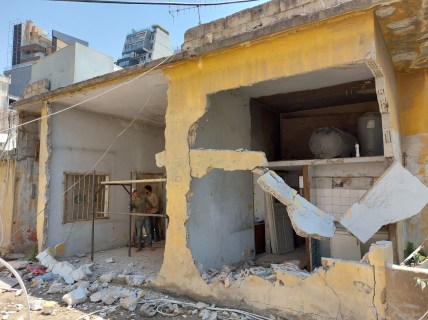
When we partnered with Tony and several of his neighbors, we first installed a large, sturdy, metal door at the building entrance to keep the residents and their belongings safe. We replaced all the stolen wires to restore electricity and repaired the damaged plumbing. Lastly, we installed a new front door, aluminum windows, a new bathroom, kitchen sink, and cabinets—everything Tony needed for a safe, functioning space.

Before we met Tony, he feared the damage was too severe for him to ever return home again. More than one year after the blast, Tony and his sister Maya have done just that. In their gratitude, they even invited everyone who worked on the repairs to join them for Christmas dinner. Tony looks forward to marrying his fiancé and raising a family of his own in his newly repaired childhood home.
Basel, Zahraa, and Freeal
Since 2016, Preemptive Love has worked in a camp for Syrian refugees in the Kurdistan region of Iraq. In 2021, we listened as residents shared their dreams for a community farm, a space where families could work, rest, and reclaim their lives. We joined hands with Basel and Zahraa, Syrian refugees who reside in the camp and now operate the farm. The space provides Syrian refugee families a chance to hone their farming skills and produce food and income for their families and community.
Basel and Zahraa work day in and day out, merging ancient agricultural techniques with cutting edge innovation. Throughout 2021, they nurtured the farm through diseases, drought, and harmful insects, building a sustainable, organic farm.
As Basel, Zahraa, and Zahraa’s son shared some of the late summer harvest with families in the camp, these neighbors began sharing from their own wisdom and experience from farming in their native Syria. One woman, Freeal, taught the team how to increase growing space using recycled containers, just as she does in her home garden. Freeal continued to share her newest findings with us, including how to quickly produce new roots and create proper drainage in a plastic container.
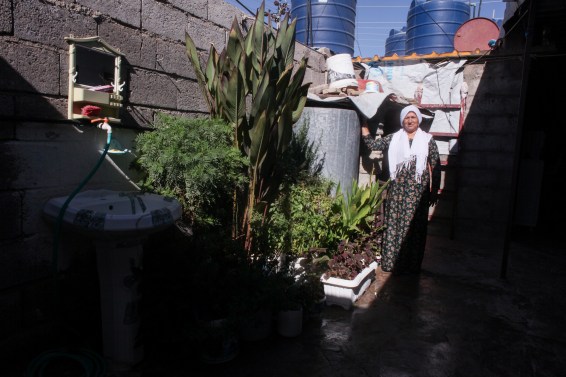
More than just cultivating food, this small-scale farming community is one in which both novice and experienced farmers alike experiment, observe, learn, and share their knowledge widely for everyone’s mutual benefit. In a space once seen only as a temporary shelter from war, these families are planting seeds and investing in the land—creating a generational impact on the entire community.
Mohammed
Mohammed is from the Al-Qurna district north of Basra, Iraq. As a young boy, he dreamed of attending college and landing a high-paying job to help support his family and improve their living situation.
Unfortunately, the family’s financial constraints required Mohammed to begin working in construction at a young age instead of finishing school. In 2010, Mohammed’s family received death threats from armed tribes in his hometown. Fearing for their lives, his family sheltered in their home, leaving Mohammed unable to work. He lost his job and his life came to a grinding halt. He could not apply for jobs and felt immense guilt that he was unable to work and contribute to his family’s livelihood.
By his mid twenties, Mohammed was safe enough to pursue his dreams again and begin working to support his family. Mohammed discovered WorkWell, our digital workforce development program. He enrolled with the primary goal of improving his English language skills, knowing this would open up greater job opportunities for him. Eventually, Mohammed decided to participate in WorkWell’s eight-week-long Business IT course. In addition to improving his English, Mohammed also strengthened his technology skills. Upon his graduation in August 2021, Mohammed secured a position as a consultant in the Health and Safety Department of ExxonMobil, a private oil company with work in southern Iraq.
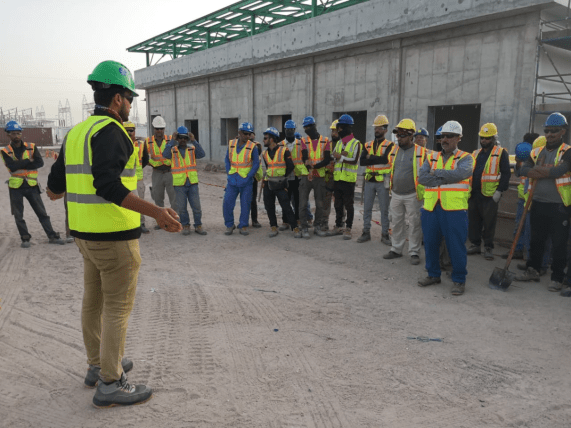
Mohammed has a great sense of fulfillment in his new work and is proud to once again contribute to his family’s financial security. Today, Mohammed earns $1,500 USD per month—233% more than he earned previously. Mohammed’s story speaks to the power of WorkWell. This program equips vulnerable and conflict-affected Iraqi youth with English and IT skills that facilitate greater employability and job attainment. But even more than that, it renews the participants’ sense of confidence, enabling them to apply for jobs and dream for a better future.
Through his new position, Mohammed has learned the importance of occupational health and safety in the oil sector. He hopes to promote this kind of knowledge by opening a training and development center for unemployed college graduates in Basra—helping young Iraqis develop needed skills, obtain quality jobs, and contribute to their communities.
Khalid
Khalid is a 45-year-old Yazidi man from Sinjar, Iraq. When ISIS invaded his hometown in 2014, he and his family of six sought refuge in a town five hours away and remained there for six years. Upon returning home in 2020, Khalid found his house destroyed. With nowhere to live, he and his family created a makeshift shelter. He struggled to put food on the table, earning only around $20 USD per week as a day laborer. Khalid soon accumulated $1,800 USD in debt and due to tight finances, had to pull his kids out of school.
We met with Khalid in late 2020 to learn more about his story. In January 2021, our job coaches provided him with 25 propane bottles and helped him start a business selling them in his local community. Khalid’s business quickly gained traction in his community. After two months, he made $50 USD a week—a 250% increase.
As his profits grew, Khalid reinvested his earnings to purchase more inventory and eventually two vehicles to transport the propane bottles, expanding his reach into nearby villages. Less than a year after opening his business, Khalid made approximately $2,000 USD per month, a staggering 2,208%* increase from his income prior to opening his business with us. Khalid recently purchased land on which to build a home for his family, and his children have been able to return to school. Khalid paid off $300 USD of his accumulated debt after six months of business operations and expects to pay off his debt entirely as he continues to grow his income.
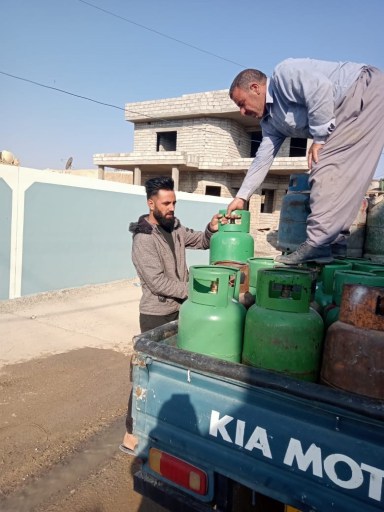
Khalid’s business hasn’t just changed life for his family; it’s had an impact on his entire community. Previously, residents of his town had to travel to the main city of Sinjar to exchange empty propane tanks, a burdensome and expensive task—especially for those without cars. Families use propane bottles to cook their meals and heat their homes. In many cases, this meant that people could neither have a hot meal nor heat their homes in the winter without traveling far distances. Recognizing the importance of his work, Khalid delivers propane bottles right to people’s doorsteps—even in more remote villages—so everyone can have heat and food.
Khalid also gives back to those less fortunate. He helps the poor by exchanging propane bottles for them on credit, so that they don’t have to sacrifice their well-being for a warm meal or a warm home. Sometimes he provides the propane bottle for free. Khalid ensures his customers get the best price, even traveling late at night to different governorates in the midst of a gas crisis in order to refill his stock and make sure his community is not affected by the rising costs.
“Before implementing this business, I didn’t have even one dollar to buy good food and clothes for my children,” Khalid said. “I will never forget how Preemptive Love supported me and made life easier for me and my family.”
*This percentage increase is calculated using standard accounting practices that define the number of weeks in a month across a one-year period as 4.333.
Francisco
Francisco is a Colombian migrant in Venezuela who currently cares for his four young grandchildren. The sixty-year-long civil war in Colombia created a large refugee and humanitarian crisis, with neighboring Venezuela hosting a large share of Colombian refugees and migrants—including Francisco and his family. His four grandchildren were abandoned by their mother and receive little support from their father, who returned to Colombia for work. Unable to secure a stable income, Francisco struggles to provide enough food for his grandchildren. He frequently sweeps his neighbors’ houses and picks up their garbage in exchange for some food.
In May 2021, Francisco brought his family to one of our medical clinics in Venezuela. The young children were suffering from malnutrition and other illnesses.
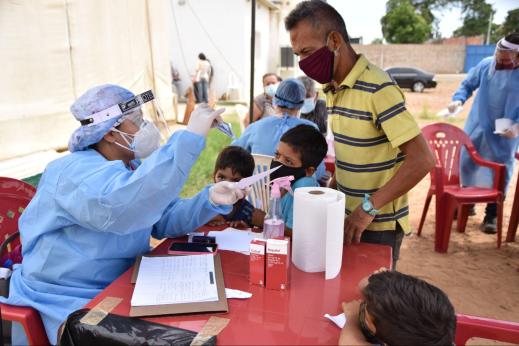
“I love my four grandchildren as if they were my own children…. It is very sad to tell you this, the need we live in is very powerful. It bends me,” Francisco said. “Feeding them is hard, but taking care of them from illnesses is even harder. The money I earn is insufficient. It is only enough to eat a little.”
Healthcare is now a rare luxury in Venezuela. Drastic supply shortages and the death of more than 700 doctors since the start of the COVID-19 pandemic have left the country’s healthcare system bare. Francisco and his grandchildren found desperately needed relief at the medical clinic we support.
“I am carrying a big bag of medicines for my grandchildren,” Francisco said, “but the biggest thing I am taking home is the great heart that you have for people, for helping selflessly. You injected me with a vaccine of love for people. Nobody has cared about my grandchildren, and today you treated them with a lot of kindness, service, and good care. I am happy for what you do.”
Eva and Ernesto
Eva is a 28-year-old chemical engineer who lives in Cañada Honda, a vulnerable community in the city of Maracaibo, Venezuela. When Venezuela’s economic and humanitarian crisis struck in 2015, Eva and her father Ernesto—a carpenter of 30 years—lost their jobs and found themselves struggling to generate any income and provide food for their family of five.
We met the family in October 2021. They shared their business idea of creating huacales– small, wooden boxes for gifts and flower arrangements. They brought years of combined experience in this craft, along with strong enthusiasm and the will to work.
After weeks of planning and coaching visits, Eva and Ernesto opened their business: Maderitas Zulianas. Facing the challenge of Venezuela’s rampant hyperinflation, our job coaches tailored a specific business coaching plan for them. Eva and Ernesto received essential training in marketing, sales, budgeting, inventory management, investments, savings, and customer care skills—everything they’d need to run a successful business.
“We have a peace of mind that we have never experienced before,” Eva said.
In the first weeks of business operations, Eva created a Christmas product catalog, a social media account, and a logo for the business, all of which helped to quickly expand their reach and impact. She has also assisted her father with the woodworking that keeps him busy. Their income is increasing rapidly, and they’re finally able to provide steady support for their family. A year of coaching support will ensure Eva and Ernesto can safely expand their business in new and creative ways, all while acting as peacemakers and helping to strengthen their community.
